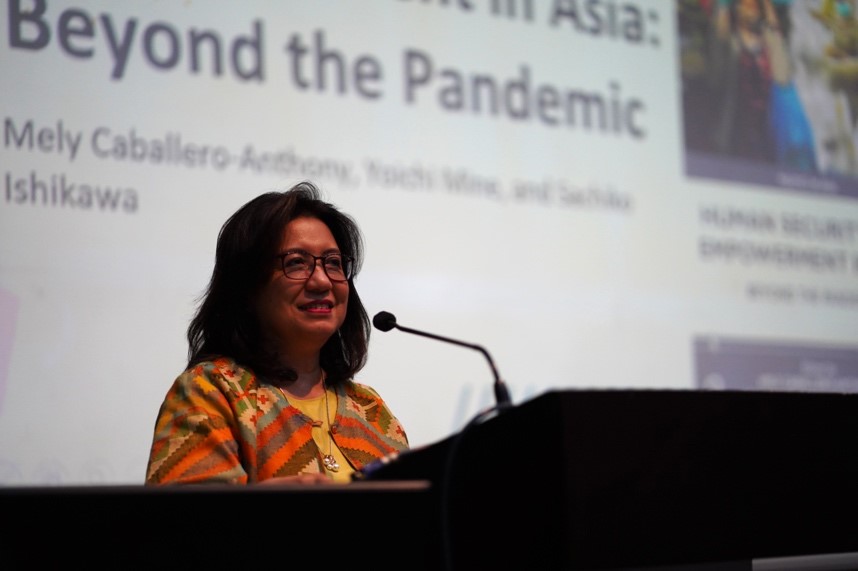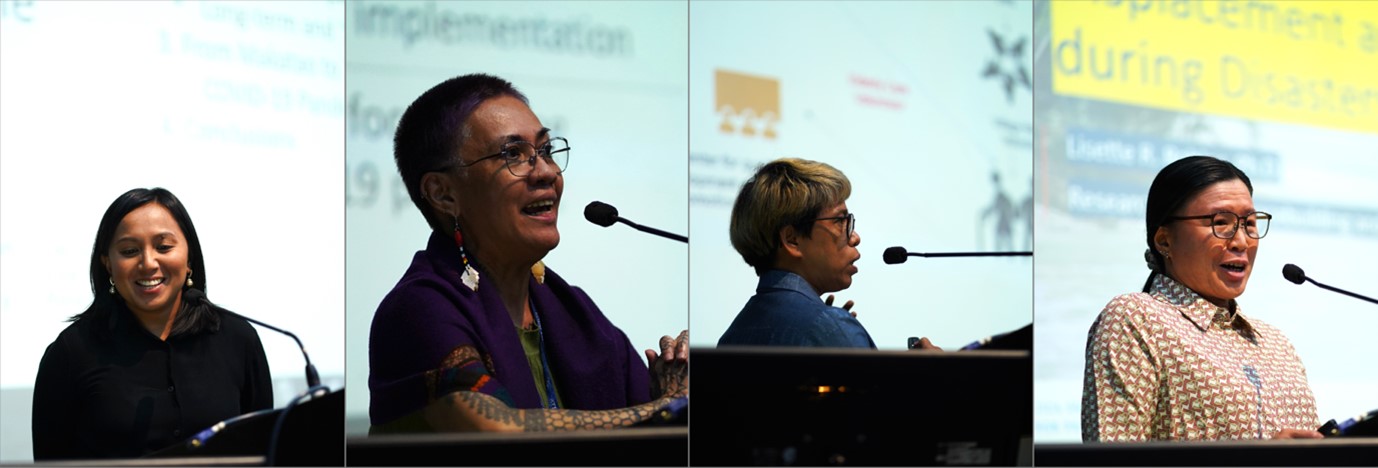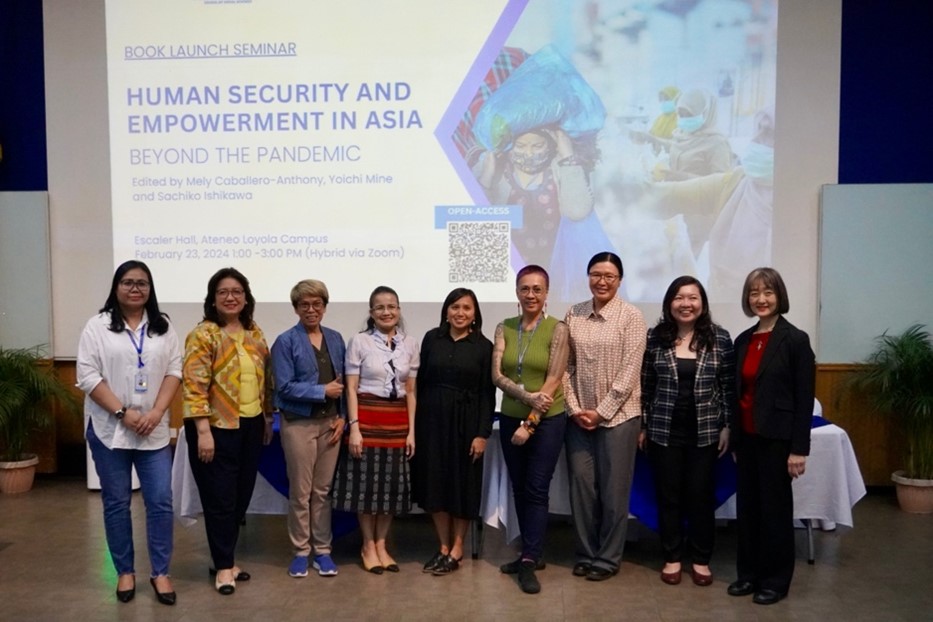Book Launch Event for “Human Security and Empowerment in Asia: Beyond the Pandemic” Held at Ateneo de Manila University
2024.04.09
On Feb. 23, 2024, the JICA Ogata Research Institute for Peace and Development (JICA Ogata Research Institute) and the Department of Political Science of the Ateneo de Manila University in the Philippines co-hosted a launch seminar for a new book on human security entitled “Human Security and Empowerment in Asia: Beyond the Pandemic.” This book results from the JICA Ogata Research Institute’s research project, “Human Security and Practices of Empowerment in East Asia,” and contains eight case studies of the unique empowerment narratives of specific vulnerable populations within the Southeast Asian region and Japan. These case studies show how ensuring human security amidst the COVID-19 pandemic was a challenging process affected by intervening obstacles and uncertainties.
The seminar began with greetings from Associate Professor Diane Mendoza of the Ateneo de Manila University and remarks from Executive Director Yoichi Mine of the JICA Ogata Research Institute. Professor Mely Caballero Anthony of the S. Rajaratnam School of International Studies (RSIS), Nanyang Technological University, Singapore, the lead book editor, then introduced the book and its key findings. She stressed the importance of understanding that our challenges are linked and underscored the value of solidarity and working together as a community.

Professor Mely Caballero-Anthony of the S. Rajaratnam School of International Studies (RSIS), Nanyang Technological University delivered the introduction to the book. ©Aaron R. Vicencio 2024.
The students of the Ateneo de Manila University and the online seminar participants then listened to four case study contributors who presented their respective chapters on health, gender, aging society, and forced migration. Maria Tanyag of the Australian National University explained how the pandemic revealed crucial “care gaps” based on the experience of “frontline” workers consisting of health workers and women’s rights service providers in the Philippines at the height of the COVID-19 pandemic. Ma. Lourdes Veneracion of the Ateneo de Manila University offered a framework for horizontal empowerment in Women, Peace, and Security (WPS) through the experiences of women’s civil society organizations in the Philippines during the pandemic. Surangrut Jumnianpol of Chulalongkorn University in Thailand examined the fulfillment of top-down protection and bottom-up empowerment against the compounded insecurities faced by the elderly population of Thailand during the COVID-19 pandemic. Lastly, Research Fellow Lisette R. Robles of the JICA Ogata Research Institute addressed the question of finding empowerment for a community in rural Japan experiencing multiple insecurities from combination of disaster displacement and immobility brought on by the flooding in Southern Japan at the height of the pandemic in 2020.

Chapter contributors: (from left) Maria Tanyag of the Australian National University, Ma. Lourdes Veneracion of the Ateneo de Manila University, Surangrut Jumnianpol of Chulalongkorn University,
and Lisette Robles of the JICA Ogata Research Institute ©Aaron R. Vicencio 2024.
The case study presentations were followed by feedback from academia and practice. Maria Ela Atienza of the University of the Philippines gave insights on this publication from its intersection with the previous research project on Human Security Norms in East Asia, and raised issues centered on the diverse forms of empowerment in the Philippine context, challenging the contributors on how to move further along not just in theory but in the practice of human security. From the JICA Philippines Office, Mary Ann Bakisan provided an overview of JICA’s work in the country through specific examples of cooperative activities in health and social development, reflecting its mission of human security and quality growth.
Under the moderation of Specially Appointed Research Fellow Ako Muto of the JICA Ogata Research Institute, the lively and engaging students of Ateneo de Manila University had opportunities to exchange with the authors, resulting in excellent and thought-provoking questions on the empowerment of diverse, vulnerable groups during COVID-19, the practice of human security, and the challenges and learning involved in conducting research during a pandemic.

Post-seminar photo with the speakers including the book contributors and seminar discussants
This latest book on human security is published by Routledge and is available in open-access format.

事業事前評価表(地球規模課題対応国際科学技術協力(SATREPS)).国際協力機構 地球環境部 . 防災第一チーム. 1.案件名.国 名: フィリピン共和国.

事業事前評価表(地球規模課題対応国際科学技術協力(SATREPS)).国際協力機構 地球環境部 . 防災第一チーム. 1.案件名.国 名: フィリピン共和国.

事業事前評価表(地球規模課題対応国際科学技術協力(SATREPS)).国際協力機構 地球環境部 . 防災第一チーム. 1.案件名.国 名: フィリピン共和国.

事業事前評価表(地球規模課題対応国際科学技術協力(SATREPS)).国際協力機構 地球環境部 . 防災第一チーム. 1.案件名.国 名: フィリピン共和国.

事業事前評価表(地球規模課題対応国際科学技術協力(SATREPS)).国際協力機構 地球環境部 . 防災第一チーム. 1.案件名.国 名: フィリピン共和国.
scroll